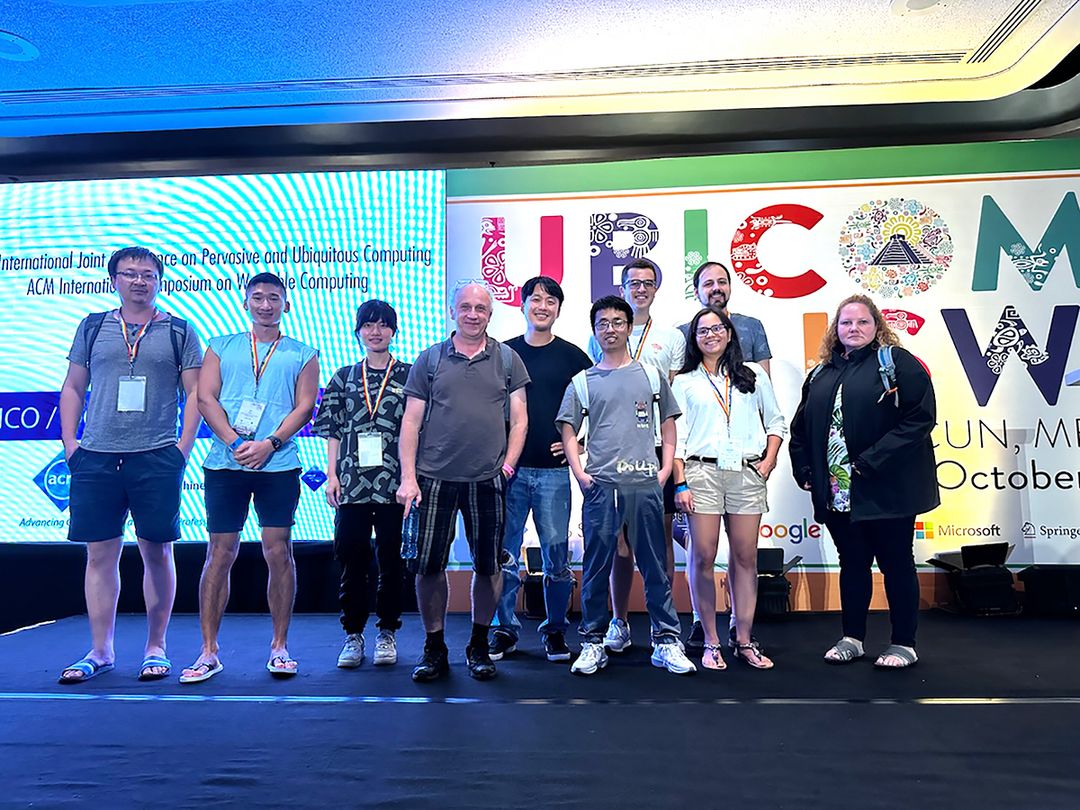Professor Paul Lukowicz, head of the Embedded Intelligence research department at DFKI and RPTU in Kaiserslautern, and his team of eight DFKI and RPTU scientists and two DFKI alumni won several prizes and awards and published numerous scientific articles:
Prof. Lukowicz, together with Helene Brashear, Thad Starner and Holger Junker, won the “20-Year Impact Award“ for their paper "Using multiple sensors for mobile sign language recognition". The award is one of the highest honours in the scientific community for ubiquitous and wearable computing. Only papers that have had a lasting impact over the last 20 years are honoured with this award.
The annual ISCW Best Paper Award, which is only given to one paper, went to Lala Shakti Swarup Ray, Bo Zhou, Sungho Suh, and Paul Lukowicz (all DFKI), for the paper "Selecting the Motion Ground Truth for Loose-fitting Wearables: Benchmarking Optical MoCap Methods".
The paper is a result of the VidGenSense project funded by the Federal Ministry of Education and Research (BMBF). Dr. Bo Zhou, deputy head of Prof Lukowicz's research department, gave three presentations on the two BMBF-funded projects SocialWear and VidGenSense:
- “Selecting the Motion Ground Truth for Loose-fitting Wearables: Benchmarking Optical MoCap Methods“
- “MoCaPose: Motion Capturing with Textile-integrated Capacitive Sensors in Loose-fitting Smart Garments“
- “Quali-Mat: Evaluating the Quality of Execution in Body-Weight Exercises with a Pressure Sensitive Sports Mat“
Dr Sungho Suh and Dr Agnes Grünerbl organised two half-day tutorials, which were carried out in collaboration with other institutes and with the support of the SembAI and Humane-AI-Net projects. SembaAI is a project at the chair of Professor Lukowicz at the TU that is funded by the Carl Zeiss Foundation.
The Humane-AI-Net project, coordinated by DFKI's Embedded Intelligence research department, is funded by the European Union and brings together top European research centres, universities and renowned industrial companies to establish AI research as an ethical and human-centric brand and strengthen Europe's position in global competition.
The team also presented six posters and demos from various projects including SocialWear, VidGenSense, Eghi (Funded by BMBF), ALMA (Funded by EU) and SembAI:
- CaptAinGlove: Capacitive and Inertial Fusion-Based Glove for Real-Time on Edge Hand Gesture Recognition for Drone Control
- Don't freeze: Finetune encoders for better Self-Supervised HAR
- FaceEat: Facial and Eating Activities Recognition with Inertial and Mechanomyography Fusion using a Glasses-Based Design for Real-Time and on-the-Edge Inference
- Capafoldable: Self-tracking Foldable Smart Textiles With Capacitive Sensing
- Unsupervised Diffusion Model for Sensor-based Human Activity Recognition
- iEat: Human-food interaction with bio-impedance sensing
The team members also presented a design exhibit in collaboration with DFKI's Design Research eXplorations (DRX) research department at the design exhibition as a result of the SocialWear project.
Dr Zhou also co-chaired the ISWC technical programme for the previous conference in 2023 and will continue to do so for the upcoming conference in 2024.

